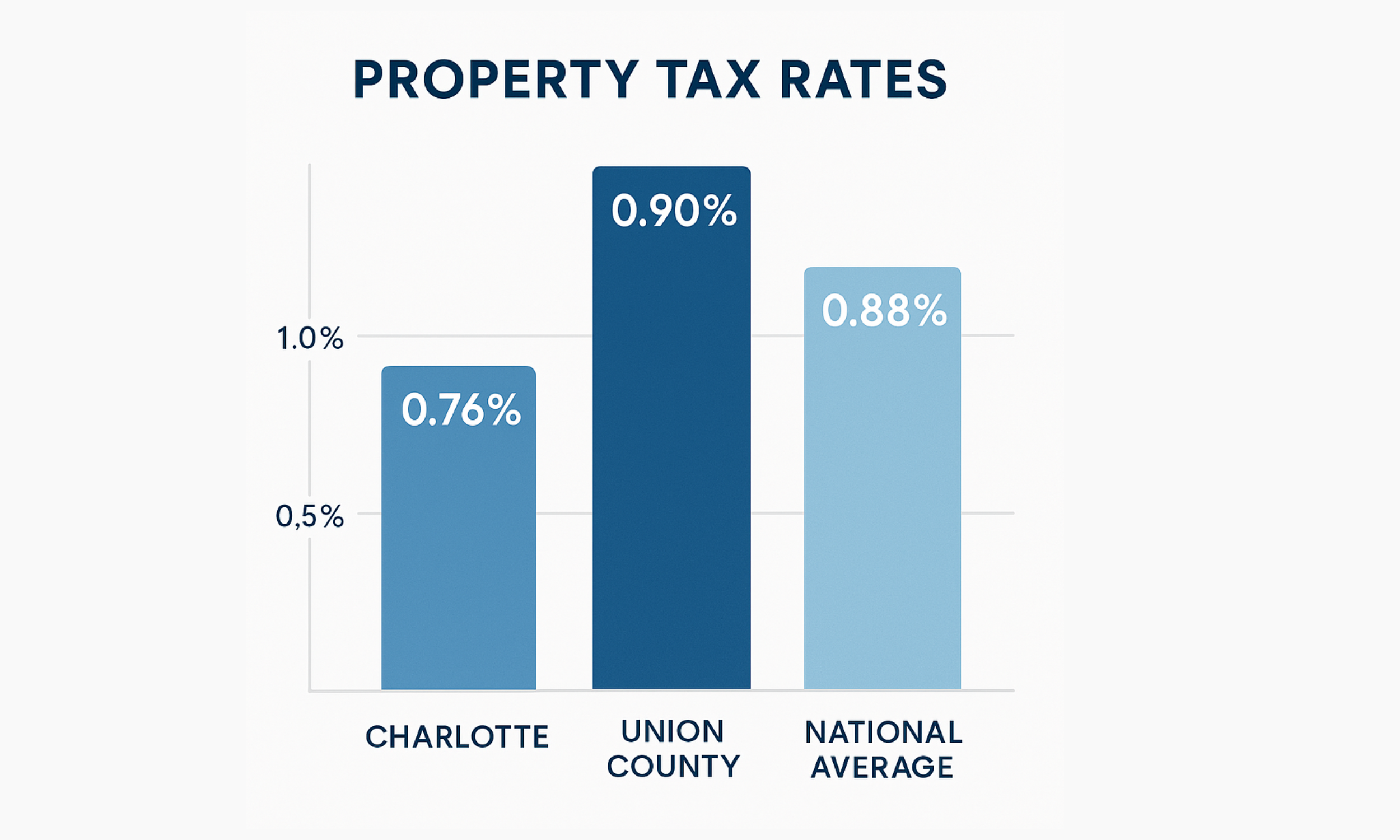5 Reasons NOT To Live in Charlotte NC in 2025
🔑 Key Takeaways:
Property Taxes:
Charlotte city property taxes are higher than in surrounding counties, leading many residents to move just outside city limits for thousands in yearly savings.Schools:
While Charlotte has some excellent school zones, nearby districts like Union County, Cabarrus County, and Fort Mill (SC) consistently rank higher overall, making them a top draw for families.Traffic & Development:
Charlotte’s rapid growth brings congestion, with average commutes around 48 minutes. Suburbs provide more space and self-contained communities with restaurants, shopping, and entertainment.Lifestyle Shifts:
Younger professionals enjoy Charlotte’s urban vibe, but many move to suburbs later for larger homes, quieter streets, and family-friendly amenities—including access to lakes like Norman and Wylie.Safety:
Charlotte is safer than many large U.S. metros, but suburbs like Fort Mill, Tega Cay, Waxhaw, and Davidson rank among the safest in the Carolinas, offering extra peace of mind.Bottom Line:
Charlotte is still a fantastic city with plenty of opportunity and energy, but suburbs often provide more affordability, better schools, family-friendly communities, and lower crime—making them the long-term choice for many residents.
Why So Many People Leave Charlotte for the Suburbs
Thinking about moving to Charlotte, North Carolina? You’re not alone. With over 117 people moving here every single day, Charlotte has quickly become one of the fastest-growing metro areas in the United States. It’s easy to see why—it constantly ranks on “best places to live” lists, it’s a major financial hub, and it offers a vibrant mix of culture, entertainment, and opportunity. From the bustling nightlife in South End and NoDa to the family-friendly events in Ballantyne, Charlotte has something for everyone.
But here’s what many new residents don’t realize: a large number of people who move to Charlotte eventually leave the city for one of its surrounding suburbs. Towns like Fort Mill, Huntersville, Cornelius, Davidson, and Waxhaw consistently attract families and professionals who initially thought Charlotte proper was their dream destination. Why the switch? For many, it comes down to lower property taxes, stronger school districts, less congestion, safer neighborhoods, and a lifestyle that better fits their stage of life.
This doesn’t mean Charlotte isn’t a great place to live—it absolutely is. But before you pack your bags, it’s important to understand the trade-offs. Knowing the realities now can help you decide if Charlotte city life or suburban living is the better fit for you. In this blog, we’ll break down the top reasons people move out of Charlotte, so you can make the right decision the first time and avoid making two moves.
1. Property Taxes: Why Suburbs Can Save You Thousands
One of the most common reasons people move from Charlotte to surrounding counties is property taxes. Inside Charlotte city limits, you pay both city and county tax, with a combined rate of 75.72 cents per $100 of assessed value. While this might not sound overwhelming, it adds up fast, especially compared to neighboring counties like York, Union, Iredell, or Cabarrus. Families can save thousands of dollars a year simply by living outside city limits.
That said, Charlotte’s property taxes remain well below the national average. With an effective tax rate of 0.62%, it’s more affordable than other major metro areas like Chicago (1.52%), Los Angeles (1.24%), or New York (1.26%). So while suburbs may offer savings, Charlotte itself is still considered relatively tax-friendly compared to other U.S. cities.
Bullet recap:
Charlotte city tax rate: $0.7572 per $100
Effective tax rate: 0.62% (below U.S. average of 1.02%)
Suburbs = potential savings in thousands over time
Don’t take our word for it
See what our clients say:
We’re Social! Lets Connect:
Table of Contents
Key Takeaways
Why So Many People Leave Charlotte for the Suburbs
Property Taxes: Why Suburbs Can Save You Thousands
Schools: Where Families Go for Top Rankings
Traffic & Development: The Cost of Growth
Lifestyle: City Energy vs. Suburban Space
Safety: Peace of Mind in the Suburbs
Final Thoughts: Is Charlotte or the Suburbs Right for You?
2. Schools: Where Families Go for Top Rankings
Education is one of the biggest deciding factors for families. Charlotte-Mecklenburg Schools (CMS) is the second-largest district in North Carolina, offering some standout schools in Ballantyne, Davidson, and Cornelius. But the quality is uneven, and not every neighborhood benefits from high-performing schools.
That’s why many families look just outside Charlotte:
Union County Schools (ranked #3 in NC) — Popular towns: Waxhaw, Weddington, Marvin
Cabarrus County Schools (ranked #8 in NC) — Flagship: Cox Mill High
Mooresville Graded Schools (ranked #5 in NC)
Fort Mill Schools (ranked #1 in SC, top 2% nationally)
These suburbs combine strong academics with more affordable housing than Charlotte’s most in-demand school zones. Private school options in Charlotte also remain some of the best in the region for families who choose that route.
3. Traffic & Development: The Cost of Growth
With over 117 people moving to the area daily, Charlotte has become a hub of growth—but with growth comes traffic. Ranked #20 in the U.S. for congestion delays, Charlotte commuters lose an average of 41 hours a year stuck in traffic. The average round-trip commute is about 48 minutes, slightly below the national average but still frustrating when combined with daily congestion.
Major arteries like I-77, I-85, and US-74 are frequently clogged during rush hours. Neighborhoods like SouthPark and Ballantyne are particularly known for traffic headaches. This is why many families opt for suburbs like Davidson, Fort Mill, or Waxhaw, which have built thriving local communities. Residents can often find restaurants, shopping, and entertainment without needing to drive into the city daily.
Bullet recap:
Average Charlotte commute: 48.2 minutes
#20 worst U.S. traffic delays
Suburbs = more breathing room + self-contained amenities
4. Lifestyle: City Energy vs. Suburban Space
Charlotte’s city center is vibrant, drawing young professionals with trendy neighborhoods like South End, NoDa, Plaza Midwood, and Dilworth. Here, nightlife, breweries, and walkability create a buzzing, energetic vibe. But as residents age or start families, many crave more space, quieter streets, and a stronger sense of community.
That’s where suburbs shine. Areas like Cornelius, Davidson, and Mooresville offer lakefront living on Lake Norman, while Fort Mill and Tega Cay provide access to Lake Wylie. Suburbs also host family-friendly events, Friday night football, parades, and festivals that foster close-knit communities.
Charlotte’s urban core offers excitement, but its suburbs often deliver the balance of space, schools, and lifestyle families seek as priorities shift.
5. Safety: Peace of Mind in the Suburbs
Like any city, Charlotte has safe neighborhoods and areas with higher crime. On average, Charlotte’s violent crime rate is 7.4 per 1,000 residents, lower than cities like Atlanta, Philadelphia, and Chicago. Still, many families prefer the extra peace of mind that comes with suburban living.
Suburbs like Fort Mill, Tega Cay, Waxhaw, Matthews, Cornelius, and Davidson consistently rank among the safest communities in the Carolinas. Their crime rates fall well below the national average, making them attractive for families prioritizing security and quality of life.
Bullet recap:
Charlotte violent crime rate: 7.4 per 1,000 (lower than many big cities)
Suburbs like Fort Mill & Tega Cay = safest towns in SC
NC suburbs like Waxhaw & Davidson = lower crime rates vs. Charlotte
Final Thoughts: Is Charlotte or the Suburbs Right for You?
Deciding between Charlotte proper and one of its suburbs really depends on your lifestyle, stage of life, and priorities. If you’re seeking an energetic urban vibe with career opportunities and nightlife, Charlotte has plenty to offer. But if you’re raising a family, prioritizing schools, or looking for more space and safety, suburbs like Fort Mill, Waxhaw, Davidson, or Cornelius might be a better fit.
Ultimately, Charlotte remains one of the fastest-growing metro areas in the country because it offers something for everyone. The key is knowing what matters most to you. Understanding the trade-offs now can save you time, money, and stress down the road.
Let’s Connect Today!

Phone:
704-631-3977

Email:
info@thefinigangroup.com

Visit Us:
3440 Toringdon Way, ste 205
Charlotte NC 28277
 (704) 200-9833
(704) 200-9833
 info@thefinigangroup.com
info@thefinigangroup.com







![How Much Is My Home Worth? [The Ultimate Guide]](https://images.squarespace-cdn.com/content/v1/67d2b38acae1897849b8377a/1743982794751-FX0FEX4DKW6R49RZ2EIK/B7e8JvhOVm4-HD.jpg)

